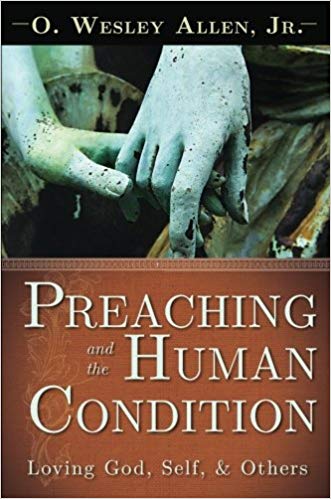Preaching and the Human Condition: Loving God, Self, & Others by O. Wesley Allen Jr.
by Derek Penwell on Tuesday, November 29, 2016

Book review by Derek Penwell
It is perhaps a commonplace to say that life in our world is complicated, and often frightening. However, with the cultural and political upheaval of the recent presidential election, life has become much more fraught for many people. When preachers speak of the “human condition,” the temptation is to slip into abstraction, neglecting the concrete aspects of life. Instead of talking about the lives and frustrations and hopes and successes of poor people, for instance, we too often settle for talking about poverty. Now, more than ever, the preacher must contend with the real lives people live, often in the face of great uncertainty.
Preaching that seeks to make space for the creative energy of the Spirit to be unleashed needs to engage on multiple levels with the human condition. People are an amazing amalgamation of impulses: spiritual, social, and psychological. Good preaching recognizes this fact, and attempts to allow the Biblical texts to speak to each area of human experience.
The homiletical responsibility for taking the whole of the human condition into account is why Wesley Allen’s latest book, Preaching and the Human Condition: Loving God, Self, & Others, is so profoundly important. Prompting us to consider how we balance the fundamental ways we experience our humanity, Allen encourages preachers to understand that the Bible, and therefore our sermons, must touch on this reality.
I so appreciate the way Allen challenges the preacher to keep the three competing (complementary?) spheres of the vertical, the horizontal, and the inner in tension with one another. I have often thought about that breakdown from the standpoint of a theology of the Fall, but had never thought about it as a model for keeping homiletical emphases in balance. I found it extraordinarily helpful in checking my own preaching against it. Since, as Allen points out, we come to preaching with different sets of fundamental assumptions, but also—to a certain extent—temperaments, it’s important to be able to name those assumptions going in. In that way we are able to think about the sermon not only from the way we might normally approach it, but it also allows us to take into consideration the different voices in a given text, as well as the needs of a diverse audience.
In particular, I liked thinking of the vertical through the lens of theodicy, and the inner through the lens of vocation. I tend to come to the text with horizontal—which is to say, social—assumptions. So, thinking about the other needs listeners bring with them is a good word to me. And I suspect readers of the book tasked with regular preaching duties will also find that articulating one’s own temperamental proclivities, and then proceeding to think through the others, will enrich the homiletical experience for themselves and the people to whom they minister.
I can’t say enough about how helpful I found the structure. It works well as a heuristic, in my opinion, but even more so as a way to keep track that our preaching doesn’t become uni-dimensional.
I’ve been carrying Allen’s tripartite structure around in my head as I write my own sermons ever since I read the book. And I must say, it has helped me to think about new ways of approaching some well-worn texts. I think this has the potential to be a powerful tool for preachers. I’m glad Allen wrote it, and extremely glad I read it.
***
Derek Penwell is minister of Douglass Boulevard Christian Church in Louisville, Kentucky and author of the book, The Mainliner’s Survival Guide to the Post-Denominational World.
Derek got his Master of Divinity and Doctor of Ministry from Lexington Theological Seminary. He defended his dissertation in December 2010 (A Manifestation of All Life: Intersections of Virtue Ethics, Philosophy of Emotion, and Philosophy of Literature), and received his Ph.D. in Humanities from the University of Louisville. Until recently, he taught Humanities and Religious Studies at the University of Louisville and Theology at Bellarmine University. The Association of Humanities Academics at UofL awarded Derek with the first-ever “Outstanding Alumnus Award.”
